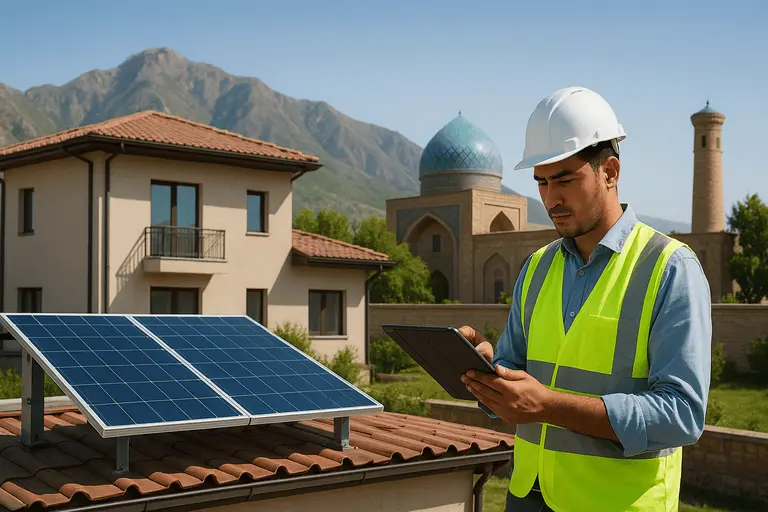
In 2025, the state allocates 1000 sums in subsidies for every kWh of energy transferred to the grid from solar panels. But do you know about all the benefits you can get?
Uzbekistan has set an ambitious goal to achieve 20% renewable energy in its energy balance by 2025, demonstrating a strong commitment to sustainable development. As part of this national initiative, a significant expansion of solar energy infrastructure is underway, with plans for 74,172 new solar panels to be installed through various state programs. This comprehensive system of benefits and incentives makes investments in solar energy particularly profitable for both individuals and businesses. Understanding all the available preferences and support mechanisms is crucial to maximizing the profitability and long-term returns of your solar energy investment.
SECTION 1: REGULATORY FRAMEWORK
Legal Basis for State Support of Renewable Energy Sources
Uzbekistan's commitment to renewable energy is firmly rooted in its legislative framework. The foundational document is the Law of the Republic of Uzbekistan No. ZRU-539, adopted on May 21, 2019, specifically addressing "On the Use of Renewable Energy Sources." This law outlines the main provisions governing the development and utilization of renewable energy, clearly defining what constitutes renewable energy sources (RES) within Uzbek legislation. It also delineates the rights and obligations of energy producers, ensuring a clear legal pathway for those investing in solar and other renewable technologies.
Further solidifying this commitment is Presidential Decree No. UP-5544, which approves the "Innovation Development Strategy." This decree sets a clear target of achieving 20% RES in the national energy balance by 2025, with long-term prospects extending to 2030. This strategic vision underscores the government's dedication to a sustainable energy future.
Additionally, Presidential Resolution No. PP-4422, dated August 22, 2019, introduces accelerated measures for RES development. This resolution focuses on organizational and practical steps to facilitate the rapid growth of renewable energy projects across the country. These legal and regulatory instruments collectively create a robust and supportive environment for the adoption and expansion of solar energy in Uzbekistan.
Sources for citation:
lex.uz - official legislative portal
minenergy.uz - Ministry of Energy of the Republic of Uzbekistan
Text of decrees and resolutions
FINANCIAL INCENTIVES
Specific Benefits and Subsidies for Solar Panel Owners
Uzbekistan offers a compelling array of financial incentives designed to make solar energy an attractive and profitable investment. One of the most significant benefits is the subsidy for energy sold back to the grid. For every kilowatt-hour (kWh) of energy transferred to the unified power grid from solar panels, owners receive 1000 sums. This mechanism is streamlined through the "Soliq" application, ensuring a convenient process for receiving payments, which are typically transferred by the 25th of each month. Importantly, these subsidy payments are not included in the aggregate income for taxation purposes, further enhancing their financial appeal.
To illustrate the potential financial gains, consider a practical example: a 10 kW solar system that produces 15,000 kWh per year. If the family's consumption is 8,000 kWh, the surplus available for sale to the grid is 7,000 kWh. This translates to an annual subsidy of 7,000 kWh × 1,000 sums/kWh = 7 million sums, equivalent to approximately $560. This direct financial return significantly reduces the payback period for solar installations.
Beyond direct subsidies, solar panel owners also benefit from substantial tax exemptions. Systems up to 100 kW are exempt from property tax for up to 10 years. Furthermore, land plots utilized for RES installations are exempt from land tax. To foster local manufacturing, equipment producers enjoy a full tax exemption for five years, stimulating domestic production and reducing overall costs.
Connecting to the grid is also made easier and more affordable through various benefits. Guaranteed connection to the unified power grid is provided, and technological connection for capacities up to 15 kW is free of charge. The procedure for obtaining necessary permits has also been simplified, removing administrative hurdles and encouraging wider adoption of solar energy.
TARGET INDICATORS AND PROGRAMS
National Goals and Regional Programs
Uzbekistan's commitment to renewable energy is underpinned by ambitious national goals and comprehensive regional programs. The overarching national objective is to achieve a 20% share of renewable energy sources in the country's energy balance by 2025. To meet this target, significant new capacities are planned, including 785 MW from solar panels and 225 MW from micro-hydroelectric power plants. These additions aim to increase the overall share of generation capacity from renewable sources to 40%.
Regional programs play a pivotal role in decentralizing and accelerating solar energy adoption. For instance, the Tashkent region aims for 15,000 households to install solar panels, while Samarkand and Bukhara regions target 12,000 and 10,000 households, respectively. A special program is also in place for the Aral region, offering unique benefits to stimulate renewable energy development in this ecologically sensitive area.
In addition to household initiatives, corporate programs are driving the integration of solar energy into commercial and industrial sectors. There is a mandatory requirement for 50% of the roofs of new multi-story buildings to be equipped with solar installations. Similar requirements are being introduced for gas stations, promoting the use of solar energy in various commercial operations. Furthermore, a prohibition on connecting new greenhouse farms to gas networks encourages the adoption of solar energy for agricultural purposes, aligning with the country's broader sustainability goals.
INTERNATIONAL CONTEXT
Uzbekistan in the Context of Global Trends
Uzbekistan's proactive stance on renewable energy is not only driven by domestic imperatives but also aligns with global trends and international commitments. The country is a signatory to the Paris Agreement, demonstrating its dedication to combating climate change and reducing carbon emissions. This commitment is reflected in its national energy strategy, which prioritizes the development of renewable energy sources.
International cooperation plays a vital role in Uzbekistan's renewable energy journey. The country has established strong partnerships with international financial institutions, notably the Asian Development Bank (ADB). This collaboration has facilitated significant investment projects, including the development of large-scale solar photovoltaic (PV) plants with capacities up to 1 GW. A memorandum of understanding with the ADB for the period 2019-2025 further solidifies this partnership, providing a framework for continued support and investment in the renewable energy sector.
These international collaborations not only bring in crucial funding and expertise but also integrate Uzbekistan into the global renewable energy landscape. By embracing international best practices and leveraging global partnerships, Uzbekistan is positioning itself as a key player in the transition to a sustainable energy future, contributing to global efforts to address climate change and promote clean energy technologies.
PRACTICAL TIPS
How to Take Advantage of State Benefits
To fully capitalize on the state benefits and incentives for solar energy in Uzbekistan, a systematic approach is essential. The first crucial step is equipment selection. From 2025, there's a strong emphasis on using equipment that meets BNEF Tier-1 requirements, ensuring high quality and reliability. Following this, professional installation is paramount. It's vital to engage only certified installers, as this is often a requirement for insurance coverage and ensures the system's optimal performance and safety.
Proper document processing is another critical aspect. A comprehensive list of necessary certificates and permits must be obtained and accurately completed. This includes documentation for grid connection, which involves understanding the specific procedures and deadlines set by energy providers. Finally, activating the benefits requires registration in relevant accounting systems to ensure you receive the promised subsidies and tax exemptions.
However, it's equally important to be aware of typical mistakes that can lead to the loss of benefits or system inefficiencies. These include installing panels without certified installers, incorrect document processing, ignoring equipment requirements (especially BNEF Tier-1 standards), and crucially, the lack of adequate insurance. The absence of insurance can pose a significant risk, potentially leading to the loss of benefits in case of damage or malfunction.
This highlights the paramount importance of insurance. Comprehensive insurance protects your state investments by safeguarding your solar system against unforeseen events. It ensures the preservation of your right to benefits even if damages occur, and facilitates rapid restoration of your system, minimizing downtime and financial losses. Investing in insurance is not just a precaution; it's a mandatory element for protecting your long-term investment in solar energy.
CONCLUSION
Uzbekistan has unequivocally demonstrated its commitment to fostering a robust and sustainable solar energy sector. The state has meticulously crafted a framework of support, creating maximally favorable conditions for individuals and businesses to invest in solar panels. The cumulative effect of these subsidies, tax exemptions, and streamlined processes is substantial, with potential savings reaching up to 40% of the total system cost. This comprehensive support significantly accelerates the return on investment, allowing solar systems to pay for themselves in a remarkably short period of 4-6 years, a stark improvement from the previous 8-10 years.
However, amidst these promising opportunities, the importance of safeguarding your investment cannot be overstated. Insurance emerges as an indispensable element of this protection. It acts as a crucial buffer, ensuring that your solar energy system, and by extension, your access to state benefits, remains secure against unforeseen circumstances. By embracing the full spectrum of state support and prioritizing comprehensive insurance, investors can confidently contribute to Uzbekistan's green energy future while securing substantial financial advantages.
Planning to install solar panels? Protect your investments and state benefits with comprehensive insurance from EUROASIA Insurance. Calculate insurance cost
SOURCES FOR THE ARTICLE:
minenergy.uz/ru/lists/view/32 - Renewable energy sources
lex.uz/docs/4346835 - Law "On the Use of RES"
norma.uz - Resolutions on subsidies
asr.gov.uz - Agency for Strategic Reforms
Import statistics - State Customs Committee of the Republic of Uzbekistan



